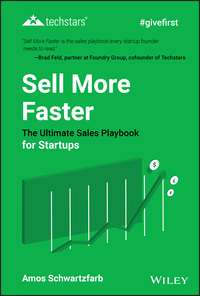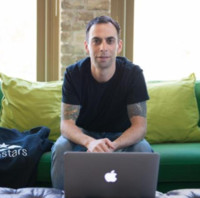Tuesday, September 3, 2019
Sales Tips For Startups From Amos Schwartzfarb, TechStars Austin

Our interview today is with Amos Schwartzfarb, Managing Director of Techstars Austin, and the author of Sell More Faster: The Ultimate Sales Playbook for Start-Ups, which comes out tomorrow. We caught up with Amos to learn about his new book, and to gain some tips for startup entrepreneurs on how to figure out when you're actually ready to scale your sales team.
Thanks for the time today, to start off, tell us a little bit about what you do?

Amos Schwartzfarb: I'm the managing director of the Techstars Austin program. I've run four programs, and have just had my fourth year anniversary, and I'm now ramping up to lead my fifth program.
How did you end up at Techstars Austin?
Amos Schwartzfarb: I have been in and a part of early stage startup companies since the mid 90's, in San Francisco. I was in a startup in the mid-90's there, which had a small but nice exit, then I joined another startup that was opening up another office in San Francisco called HotJobs. I was a sales person at HotJobs, but after we went public I helped open up an office in Los Angeles, and lived in Los Angeles for eight years. I opened up an office for them, doing early stage selling, then I built a client services department for HotJobs, and then after Yahoo acquired them, I moved back into sales, in Sales Management, and I helped manage and rebuild a team in San Francisco. The, I moved back to LA and helped build out our strategic account management and our strategic sales team for HotJobs. I left HotJobs, and started another company, with Jake Winebaum, called Work.com, while he was running Business.com. We ended up merging those two companies together and I took over client services for Business.com, around the time Benchmark invested in us, and we ended up selling that company to R.H. Donnelly in 2007. I thought I'd swear off early stage companies, even though I ended up three or four more after that. I moved to Austin shortly after that company, and started a small music company with a friend of mine. It really wasn't meant to be a company, just a hobby, but we ended up selling it to a music rights company. That's when I joined as the second grown-up, or gray-hair, for a company called Black Locus, which was a startup that came out of Carnegie Mellon which had won a Rice Innovation Award. They got a bunch of investors, including some from Austin. They brought Rob Teller in to run that company, and Rob brought me in to run sales. That was a really fast stint, we started with only a couple of small customers but ended up taking it to $120K MRR and sold it to Home Depot at a significant multiple above revenue. Then, I started yet another company, which crashed and burned, but one of my investors in that company was at the time the Managing Director of Techstars Austin, and the short story is I told him sorry, the company was not going to make it, I was not going to return his capital, and he said—cool, I'm moving on to a new role at Techstars, do you want my job? That was four years ago.
What's the new book about?
Amos Schwartzfarb: The book is called Sell More Faster, the Ultimate Sales Playbook For Startups. I didn't really set out to write a book. What I set out to do, was to put together some referencable materials for founders to have, both inside and outside Techstars. The reason why, is my experience is in early stage sales and more specifically, in early stage customer development. Certainly, both inside the programs I have run at Techstars, as well as outside, I've always been that person where if someone has a question about sales or early customer development, they would direct them to me. I was getting the same questions over and over, and I thought it would be great to have materials I could point people to get the conversation started, and take it from there. That progressed very quickly into the opportunity to turn that material into a book. This book is largely a culmination of 20 years of an operators and four years of advising companies. It is a playbook. What are the operational things you need to do, to get product market direction, to get product market fit, how to know when you've achieved it, and what you do when you have achieved it. It's how do you scale, how do you scale your sales organization, how do you scale the whole organization around sales, how do you make sure you're not just closing customers, but closing the right customers to so you'll ideally have them around for the entire duration of your company.
What are some of those questions that you've had to answer over and over again?
Amos Schwartzfarb: Probably the most frequent question you hear, is, “is it time for me to hire a sales person?”. The answer is almost always “NO”. The reason is, if you're asking the question, in my experience you don't really know who your customer is, you just have a theory of who you think they will be; you don't really know what they're buying from you, you just think you know what you want to sell them; and you think you know why they are buying it, but you don't actually have any measurable data to prove it, even on a small scale. My answer, and we're talking mostly about pre-Series A companies, is to go back to some basic blocking and tackling. One of the main premises of the book, is figure out who you are selling to, what they are buying from you and why they are buying it. Before you have data to figure that out, you're in customer development mode, and you shouldn't have a sales person. You might want to hire a customer development person if you're lucky enough to find one, but if you're the founder of the company, and you don't know the answer to these questions and the data to support them, you need to be taking to some of, if not all of the early potential customers.
So you think startups hire a sales person and VP of sales too early?
Amos Schwartzfarb: Very often. In fact, I sort of profess, your sales hire should not be a sales hire, but a customer development hire. A customer development person is a cross between a sales person and a product marketer. You're going out and learning and trying to figure out if I am right, or if I'm not fully right, and how do I tweak what I know to be true, and create something that is long term sustainable and valuable.
After the founders read your book, what do you hope they gain from it?
Amos Schwartzfarb: My hope is that, at a bare minimum people read it and say, there is a framework here I can use, to use data to test whether what I believe is going to be a company is true. So, either they can spend less time figuring stuff out, because they have a framework to how to build a successful company, and/or, there is not actually an opportunity there, and they need to go pursue something different.
So, as a founder, how do you tell when you've finally figured these out, and now's the time to scale your sales?
Amos Schwartzfarb: To the degree that it's possible, always use quantifiable metrics. Every business is different, every customer is different, but how I describe it in the book, is when are you not learning new things on every customer development conversation? When are you hearing the same things, and where you have developed the product so it can be repeatable, to address the things that the customer actually needs, even if they don't know that they need it. So, it's after 10 conversations, 50 conversations, 100 conversations, and you realize you're not really learning something new, that I can guess what they're going to say or the questions they're going to ask, and go to the next level and the level beyond that because I have heard the question enough times that I have the answer, that we have what satisfies what they are looking for, that's when I think that's the moment, and we have something repeatable here. Now, you want to prove that you're right, and that's where you hire a single person and see if they can do the same thing with the data you've given them. That second hire is also getting the same thing, you know it's repeatable. Now it's time to actually build the team, not building the product that this person will sell.
Thanks!